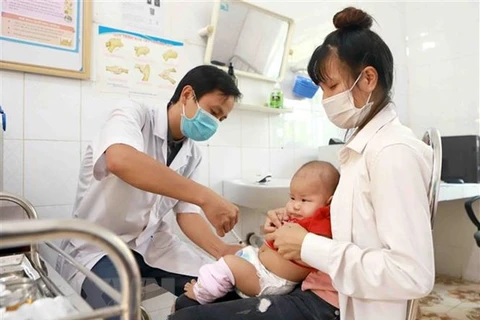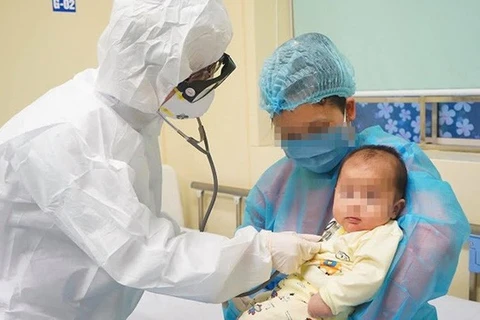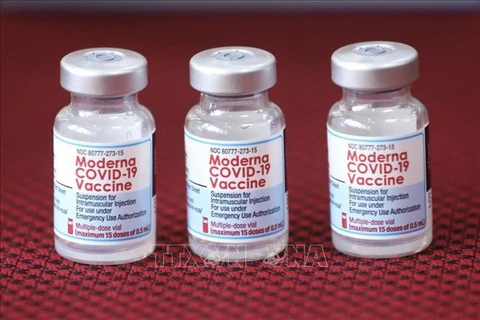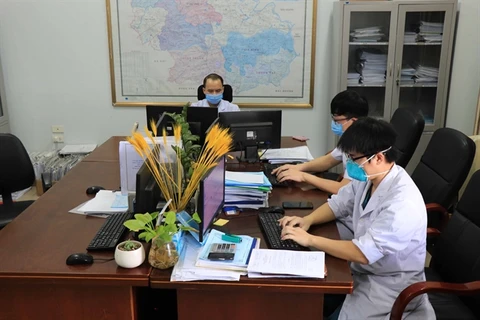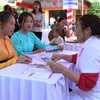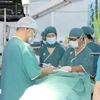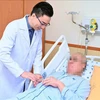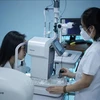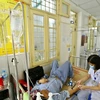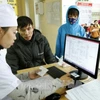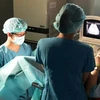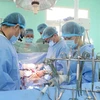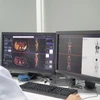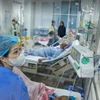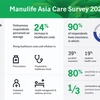Hanoi (VNS/VNA) - According to new guidance from the Ministry of Health, it is not necessary to regularly test newborns who are infected with COVID-19, even if their caregivers have the virus.
Infants with COVID-19 can take home treatment if they are asymptomatic or have mild clinical symptoms and no serious symptoms.
The ministry’s guidance points out specific serious signals in the newborn such as breastfeeding less, dozing off and finding it hard to wake up, signs of respiratory failure, groaning, wheezing, rising and falling nostrils, and apnea lasting more than 20 seconds.
Other danger signs are convulsions or spasticity; unusual movements; body temperature above 38 degrees Celsius, which does not improve after 48 hours; hypothermia below 36 degrees; red or pus-filled eyes, red or swollen belly button; signs of dehydration; and jaundice before three days of age, especially within 24 hours of birth.
Continuous vomiting, abdominal distension, diarrhea, bloody stools are also serious signals for the babies’ digestive health.
If both mother and infant are confirmed to have COVID-19, breastfeeding should be maintained.
If the baby has a stuffy nose, which causes difficulty when suckling, the baby's nose should be cleaned before feeding. If the baby is unable to suckle, use a spoon to feed breast milk to the baby.
If only the mother is confirmed to have COVID-19, mothers and families should be counselled about breastfeeding and the risks.
Pregnant women who are treated at home also need to monitor their health status such as measuring their body temperature at least twice a day. They should count breathing rate, pulse, SpO2 and blood pressure (if possible) daily.
They must also pay attention to fetal movements.
Once finding abnormal obstetric signs, they should immediately notify medical staff or visit a medical facility. It is also necessary to maintain regular antenatal check-ups.
Antenatal check-up is recommended at any time if abnormal signs are detected or when indicated by medical staff.
If a pregnant woman with COVID-19 has antenatal care appointment and has no abnormal signs of obstetrics, a remote antenatal check-up can be performed or the pregnant woman can wait until the end of isolation.
Pregnant women also need to follow a healthy diet, do exercises, supplement with micronutrients, not take tobacco and be exposed to secondhand smoke, not use alcohol, beer and other stimulants or narcotics./.
Infants with COVID-19 can take home treatment if they are asymptomatic or have mild clinical symptoms and no serious symptoms.
The ministry’s guidance points out specific serious signals in the newborn such as breastfeeding less, dozing off and finding it hard to wake up, signs of respiratory failure, groaning, wheezing, rising and falling nostrils, and apnea lasting more than 20 seconds.
Other danger signs are convulsions or spasticity; unusual movements; body temperature above 38 degrees Celsius, which does not improve after 48 hours; hypothermia below 36 degrees; red or pus-filled eyes, red or swollen belly button; signs of dehydration; and jaundice before three days of age, especially within 24 hours of birth.
Continuous vomiting, abdominal distension, diarrhea, bloody stools are also serious signals for the babies’ digestive health.
If both mother and infant are confirmed to have COVID-19, breastfeeding should be maintained.
If the baby has a stuffy nose, which causes difficulty when suckling, the baby's nose should be cleaned before feeding. If the baby is unable to suckle, use a spoon to feed breast milk to the baby.
If only the mother is confirmed to have COVID-19, mothers and families should be counselled about breastfeeding and the risks.
Pregnant women who are treated at home also need to monitor their health status such as measuring their body temperature at least twice a day. They should count breathing rate, pulse, SpO2 and blood pressure (if possible) daily.
They must also pay attention to fetal movements.
Once finding abnormal obstetric signs, they should immediately notify medical staff or visit a medical facility. It is also necessary to maintain regular antenatal check-ups.
Antenatal check-up is recommended at any time if abnormal signs are detected or when indicated by medical staff.
If a pregnant woman with COVID-19 has antenatal care appointment and has no abnormal signs of obstetrics, a remote antenatal check-up can be performed or the pregnant woman can wait until the end of isolation.
Pregnant women also need to follow a healthy diet, do exercises, supplement with micronutrients, not take tobacco and be exposed to secondhand smoke, not use alcohol, beer and other stimulants or narcotics./.
VNA

